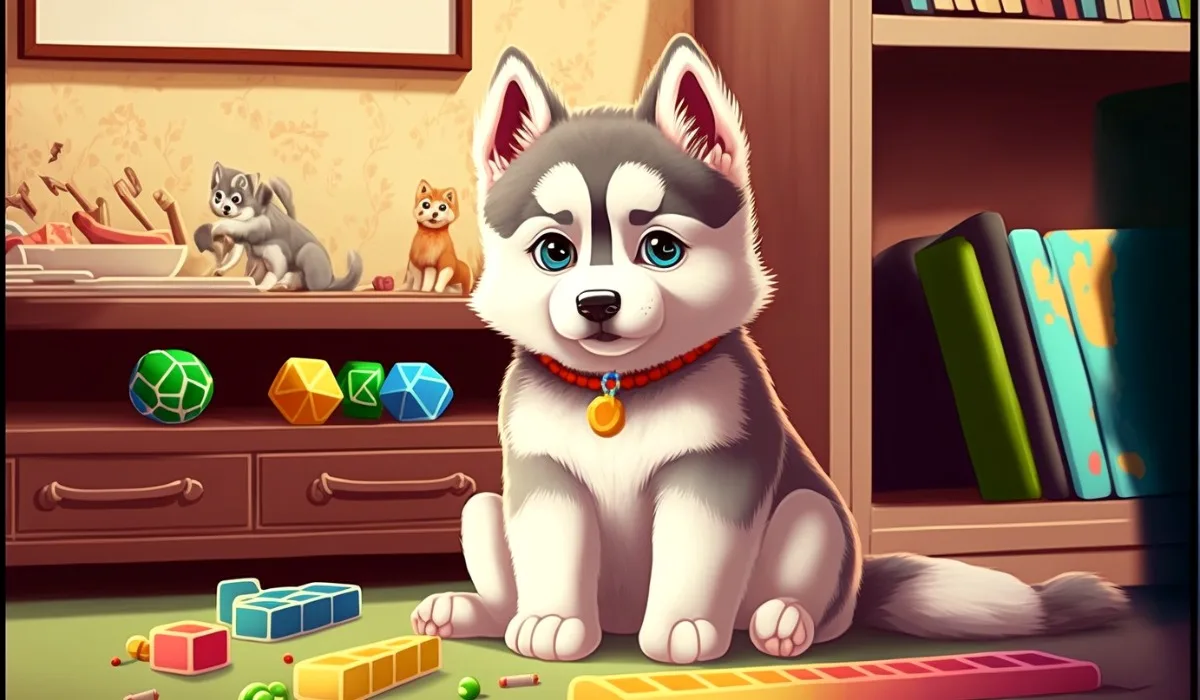A husky that’s whining can quickly become a bother and make you worry. Why are they doing it? Do they just want attention or is it a big deal?
If your husky is whining, whether it’s day or night, you’ll want to find out why and what you should do.
This article tells you all you need to know. Let’s dive in!

Why Your Husky Whines
Simply put, when your husky whines, they are trying to tell you something. Whining is one of the most basic methods of communication dogs understand.
Thankfully, not all whining suggests there is something seriously wrong. But in most cases it does mean “something” is at least bothering your husky.
There are various reasons causing whining, but what owners need to take note of is WHEN the whining happens. Noticing the triggers and patterns leading up to the whining will help you quickly identify the correct cause.
The main reasons why your husky is whining:
- He needs to be let out (potty breaks)
- Owners have accidentally been reinforcing the behavior
- He’s waiting for a daily event to happen (anticipation build-up)
- He’s seeking attention (bored)
- He’s overly anxious or excited about something
- He’s anxious and nervous about something
- He’s on his own or isolated
- He’s sick or in physical pain
- He’s suffering from a health issue
Your husky’s whining will be covered by at least one of the reasons listed above.
When Does Your Husky Whine? (Is It Serious)
To tackle a whining issue properly, owners must know what’s causing it. And the quickest way to do that is to notice what triggers the whining and when it happens.
This will also tell you if the whining is something severe or if it’s just a bad behavioral tick.
🎯 When whining is probably not serious:
If your husky is whining while waiting for something, it’s usually not a big deal. It makes sense, actually. They might be telling you they need to go to the bathroom or that it’s time to eat. This is normal and not something to worry about.
It could even be that your husky whines in order to wake you up or when you come home from work and they can’t contain their excitement for 10 minutes or so.
🎯 When whining signifies something is wrong:
If the whining happens after ALL his basic needs are taken care of, then it usually suggests there is something wrong.
In these cases, whining indicates an issue with a husky’s emotional state and shows they are stressed, unhappy, frustrated, scared, or even in pain.
It could also mean there is something fundamentally wrong with their daily routine, lifestyle, and environment, and they’re suffering due to it.
Inadequate daily routines can increase:
- Stress
- Anxiety (including separation anxiety)
- Boredom
- Frustration
- Fearfulness
All of which contribute to whining and discontent.

Psst. A quick word on training! Brain Training For Dogs might now be one of the best training methods suitable for a husky. Owners are seeing improvement in obedience, behavior, and stubbornness quicker than ever before. I seriously recommend checking it out.
Underlying Causes of Whining & Solutions
Let’s explain the underlying triggers of whining along with the best solutions.
1. Lacking stimulation (physical & mental)
Huskies are not a set-n-forget kinda doggo! They need constant stimulation, and owners really need to keep them active and entertained to be content.
- Lacking stimulation, either physical or mental, is by far the most common reason why huskies whine.
Most owners are well aware of their husky’s physical needs and usually have this taken care of, but it’s the mental stimulation part that stumps many.
Huskies need their minds put to work to keep them calm and content. Without proper outlets throughout the day to release their mental energy, they’ll quickly get frustrated and anxious. This leads to hyperactivity, bad behavior, and other things like whining.
🎯 Solutions to this:
Consider how much mental stimulation your husky is really getting.
Is your husky receiving daily command training activities, using puzzle toys, and socializing with other dogs? Ideally, a husky gets to engage in all of these things and more on a daily basis.
This will ensure their minds are satisfied and that they feel calm and content throughout the rest of the day when nothing much is going on.
And with physical exercise owners should aim for at least 90 minutes per day. Ideally 45 in the morning and another 45 in the evening.
By exercising first thing in the morning, you’ll expend a lot of pent-up energy your husky has gained while sleeping. This really does make a massive difference to their behavior for the rest of the day.
What this will help
- Whining caused by boredom/frustration
- Whining caused by low-level anxiety
- Whining caused by attention-seeking
- Whining caused by the crate
- Random whining throughout the day
Leveling up your husky’s physical exercise and daily mental stimulation will improve their life significantly, and this will quickly reflect in their behavior, obedience, and overall well-being.

2. Accidentally reinforcement of whining
This is a big one and could be happening with you and your husky.
It is EASY to accidentally reinforce the very behaviors we are trying to stop. And it’s all to do with how we respond in the moment to these behaviors.
It’s normal for us to respond to our husky when they whine… We ask them what’s the matter, and we show them attention in order to solve the issue. Sometimes owners might even play with them and give them a treat.
Most of the time this will work to stop the whining, and while you may be satisfying your husky’s attention needs, you’ve actually reinforced the whining too. Your husky will immediately make the link between a positive reaction and their whining, which causes them to do it more in the future.
🎯 Solutions to this:
It’s crucial to give positive attention to your husky when they’re behaving correctly, not behaving in ways you disapprove.
This sounds obvious but it’s contrary to what most owners actually do.
It’s all too easy to ignore our dogs when they’re calm and content, but suddenly respond to them when they misbehave or do something we don’t want. This is wrong.
In the moments your husky is quiet or behaving well, it’s time to capitalize and give him your attention, praise, and rewards.
Over time this will clearly show your husky what behaviors earn them the most attention and approval. And at the same time, he’ll disassociate whining from your attention.
Granted, I’m not suggesting owners completely ignore their whining husky. As something might actually be wrong. But just be conscious of the reaction given to the whining. Never accidentally reward it.
What this will help
- Whining caused by attention seeking
- Whining that’s developed into a habit
3. Being left alone too much
As most already know, huskies really don’t like being left alone!
Over time, being left alone too long and too often can cause a lot of stress, anxiety, and discontent, even if it doesn’t obviously show it.
Not to mention separation anxiety! (which is a whole different monster)
You may immediately know if this applies to your husky or not by how much they are left alone each day.
If it’s more than about 4 hours, this can definitely be enough to cause excess whining when you finally get back home.
For other breeds, 4 hours alone might be a breeze, but for huskies, it’s quite a bit. And it will likely reflect in their behavior.
🎯 Solutions to this:
It’s hard to know if this IS the cause, but if you get an idea that your husky’s whining is related to your absence, then it’s time to make a few important changes.
If your husky’s typical day involves them spending 4+ hours alone, then it’s worth looking into pet sitting, acquiring a lunch break at home, or even asking friends or family to visit your husky.
While this can be a difficult issue to resolve, it’s crucial to reduce the time he spends alone.
What this will help:
- Whining caused by stress and anxiety
- Whining caused by isolation and loneliness
- Whining caused by boredom/frustration
Husky Puppy Whining Overnight: Explained
Nighttime whining is a common issue with huskies puppies, so you’re definitely not alone with this one.
This ultimately happens because your puppy is still getting used to their environment and hasn’t quite adjusted to being alone at night without their mother and siblings.
While this usually goes away on it’s own, it’s best not to leave that down to chance. So let’s run through what to do.
👉 Stick to a bedtime routine
A bedtime routine can help your puppy sleep through the entire night without a fuss quickly and easily. So it’s definitely worth putting in place.
- Make sure your husky’s last meal, treat and drink is no later than 6pm.
- Be sure to take your husky out multiple times for potty before sleeping.
- Give your husky a 20 minute slow belly rub before being put in their crate.
By doing these three things, you tick all the boxes.
You’re giving his bladder the best chance to digest food and by providing many potty breaks you it’ll help reduce the need to eliminate while asleep (although this will not happen perfectly for a while).
Additionally, 20 minutes of undivided attention will calm them down and get them ready to sleep.
👉 Take the crate to your bedroom
Whining at night is partly caused by your husky being scared or feeling alone. This can be somewhat stopped by simply moving the crate to your room.
Your husky will be able to smell and hear that you are in the room with them while they sleep and this will instantly reduce their nerves and ultimately their whining.
How Long to See Results
Stopping your husky’s whining can take as little as few days to several weeks. This depends on the cause and how long it has already been happening.
Whining that has been allowed to develop for a long time, as well as whining caused by underlying stress can take weeks to rectify.
The most important thing I can say is that owners must remain consistent in improving their husky’s overall daily routine and life in general. The whining will stop eventually so long as your husky’s routine is exactly what they need.
When To Seek Veterinarian Help
Whining can sometimes indicate a serious issue, so it’s important to be aware and ready to contact your veterinarian.
I recommend contacting your veterinarian if:
- The whining has been happening for a long time and you can’t resolve it
- The whining is happening ALL the time
- Your husky displays other symptoms (vomiting, diarrhea, lethargy, unusual behavior)
- You’ve already tried rectifying this behavior and it’s still persistent or getting worse
There’s no wrong moment to speak to your veterinarian other than too late! So if you really have no idea as to why the whining is happening, contact your vet without hesitation to get a professional opinion.
Thanks for reading!
Disclaimer
The advice given in this article is for educational purposes only and does not constitute professional advice in any context. Before making any decisions that may affect the health and/or safety of your dog, you should always consult a trained veterinarian in your local area. For the FULL disclaimer Visit HereCopyright Notice: The content produced and published on My Happy Husky is unique and original. My Happy Husky makes an active effort to search for plagiarized content using plagiarism detection software. If plagiarized content is found, action will be taken.
